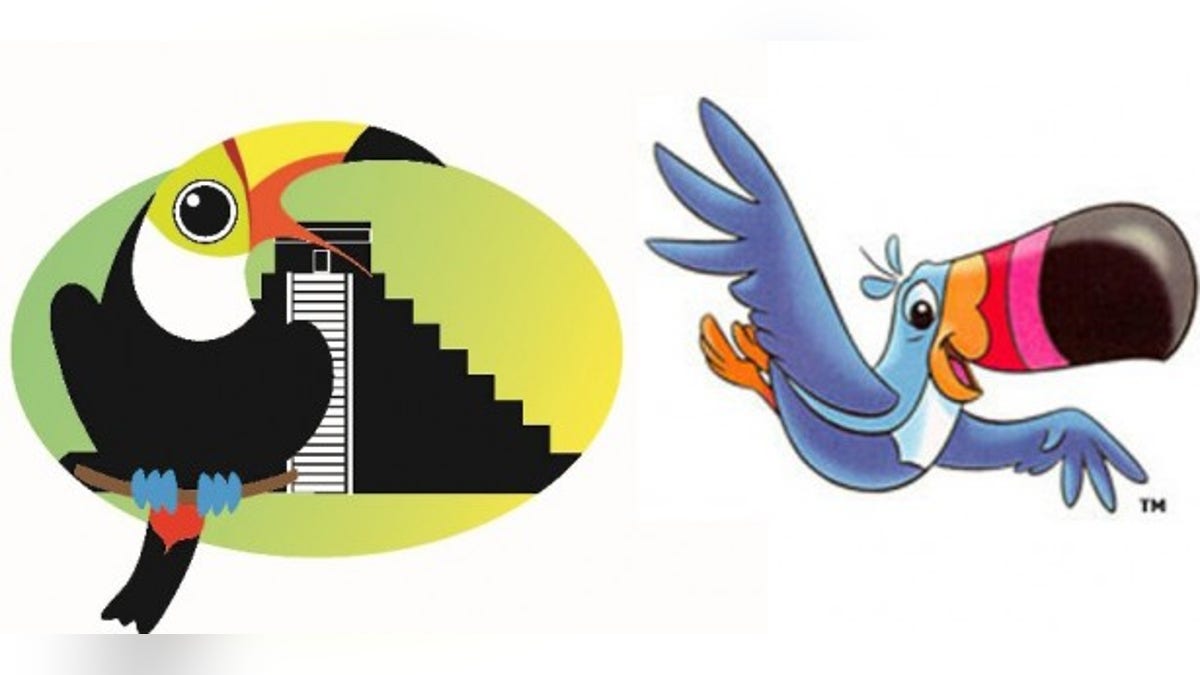
The Maya Archaeology Initiative's logo and Toucan Sam from Froot Loops.
The Kellogg Company bit off more than it could chew when it threatened legal action against a Mayan group over use of its toucan logo it claimed resembled Toucan Sam.
The Froot Loops maker initially went after the California-based Maya Archaeology Initiative (MAI), a project of the non-profit World Free Press Institute (WFPI), throwing it for a loop.
"We were stunned," Clay Haswell, chairman and co-founder of WFPI, told Fox News Latino. "We thought that our logo was completely unique and after reviewing it we could see absolutely no comparison or similarity to the Toucan Sam cartoon character."
In a July letter from its attorneys, Kellogg asserted that MAI's use of a toucan infringes on its trademarked Toucan Sam character, games and other promotional goods and services, according to Indian Country newspaper, a national weekly publication.
MAI checked out Kellogg's website to see what the company might object to. What it found touched off a response Kellogg didn't bargain for.
- Guatemala Issues Decree Speeding Up Child Adoptions
- Fireworks, Flutes and Flying Bodies at Guatemala’s Feast of Santo Tomás
- Faces of the Immigrant Archive Project
- Guatemalan Syphilis Experiments by United States Were “Unusually Inhumane,” Says Panel
- America’s Third War: Guatemala
- Ex-Guatemalan First Lady Can’t Run for President Despite Divorce
- Michael Jordan of Bullfighting Returns
- ‘Knights Templar’ Drug Cartel Lives by Medieval Code
- Jobless Mexicana Flight Attendants Pose for Calendar
A game in its Adventure series, it found, put kids in a Mayan setting – and the only character of color was the villain, an evil witchdoctor who cackles and steals.
"Suddenly, [this fight] became a little bit more important to us than protecting our trademark," Haswell said, according to the paper.
The former newsman, who was with the Associated Press for 18 years, said he was sensitive to what he feels is a misrepresentation of Mayan culture through stereotypes.
For its part, Kellogg, possibly rethinking its approach, responded swiftly and took the game off of its website.
"MAI raised some points about the cultural sensitivity of one of our marketing executions that we hadn’t considered," Kellogg company spokesperson Kris Charles said in a statement.
"As a company long committed to diversity and inclusion and responsible marketing, Kellogg takes this concern very seriously. We removed the game in question from our website and will incorporate their feedback in our future marketing efforts," the statement read.
Kellogg and MAI are in talks, too, to "identify a solution whereby [MAI] can continue to use their logo for fundraising efforts," Charles wrote.
"We're encouraged," Haswell said. "I think that a company as large as Kellogg’s has a lot of good to do in the world. We are trying to support education for Mayan children and our hope is that we will not only be allowed to proceed with those efforts but we will have Kellogg’s support in doing so."
MAI's mission, Haswell said, is to provide educational opportunities for Maya children, protect Maya antiquities, and to help defend biodiversity in the rainforest.
To that end, Haswell's colleague, Dr. Francisco Estrada-Belli, an archaeologist, is working in the Petén region of Guatemala, where artifacts are unprotected and open to theft from looters who pillage the sites. He famously was examining a looter’s trench when he made a heart-stopping discovery – the looting had stopped six inches from a ceremonial vault.
"Inside that vault were these enormous ceramic masks, six meters tall," Haswell said. "They're probably the oldest iconic images that remain from the Maya."
An archaeological zone deep in a Guatemalan rainforest that acts as a window into a civilization long since past is, indeed, a long-way from a colorful cartoon mascot for a sugary children's cereal. But a somber Haswell wants people to learn from this spat.
"That it’s not ok to use iconic images from indigenous cultures for commercialization," he said. "Guatemala is a poor country with only a couple of resources. They have Mayan artifacts and remnants of Mayan culture. And a whole lot of young kids that need a better opportunity."
Contact Adrian Carrasquillo at Adrian.Carrasquillo@foxnewslatino.com or on Twitter @RealAdrianC.
Follow us on twitter.com/foxnewslatino
Like us at facebook.com/foxnewslatino








































